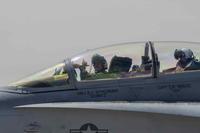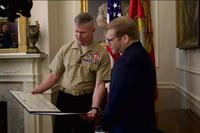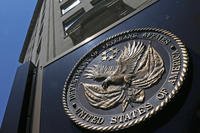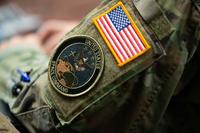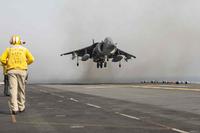Indiana Gov. Mike Pence went on Twitter and a morning show Monday to gloss over running mate Donald Trump's seeming rebuke of him on Syria policy in the second presidential debate.
"Congrats to my running mate … proud to stand with you," Pence tweeted following Sunday's debate in which Trump gave a one-line dismissal of Pence's proposal for the U.S. to use force to stop the bombing of Aleppo by Russia and the Syrian regime.
"I haven't spoken to him [on Syria], and I disagree," Trump said at the debate with Democratic candidate Hillary Clinton at Washington University in St. Louis.
On Fox News' "Fox & Friends" program, Pence made no mention of his apparent dispute with Trump and instead lauded what he called Trump's winning performance in the debate against Clinton.
"The real story this morning is Donald Trump stepped up and won the debate last night that seemed to be against all odds. He stepped up. He showed humility, he showed strength, he expressed genuine contrition for the words that he had used on the video that became public, and then he moved directly into the choice the American people are facing."
Pence dismissed rumors that he might drop out of the race in disgust at Trump's remarks and said he was proud to be on the ticket.
The "contrition" reference was to the disclosure last Friday of a 2005 tape from NBC's "Access Hollywood" in which Trump made obscenity-laced comments about women and boasted of his ability to make advances because of his "celebrity" status.
Republican leaders and elected officials over the weekend began distancing themselves from Trump and withdrawing their support. While maintaining his support for the Republican ticket, House Speaker Paul Ryan, a Wisconsin Republican, told colleagues Monday that he will no longer campaign for or defend Trump, The Washington Post reported.
In a conference call with Republican House members, Ryan said he is "only campaigning for House seats and promoting our agenda," the Post reported.
On the Sunday morning talk shows, Trump loyalist and former New York City Mayor Rudy Giuliani had to deny that Trump was thinking of not showing up for the debate and dropping out of the race.
Damage control
In an effort at damage control Sunday, Trump pointed at former President Bill Clinton's behavior toward women and charged that Hillary Clinton had demeaned her husband's accusers.
Trump held a news conference before the debate with three women who claim they were abused by Bill Clinton and a fourth woman who charged that Hillary Clinton, as a defense lawyer, won a plea bargain for a man accused of raping her as a 12-year-old. The four women sat in the front row at the debate.
During the debate, Trump said he was "embarrassed" by his "Access Hollywood" remarks and called them "locker room talk." He said he was unsurpassed in his respect for women and did not actually engage in the aggressive behavior that he had boasted about.
The 90-minute debate was a town hall event with Trump and Clinton facing questions from uncommitted voters chosen by the Gallup polling organization. The candidates did not shake hands as they were introduced before the questioning began but did as the debate ended.
The moderators were Martha Raddatz of ABC News and Anderson Cooper of CNN. Prior to the debate, Raddatz urged the audience with little success to refrain from "booing or cheering of any kind."
The debate rules allowed the candidates to walk about the stage to engage more directly with their questioners, but Clinton and Trump spent most of their time engaging heatedly with each other. Both generally ignored the moderators' attempts to limit their responses to allow for more questions.
Defense and national security issues were mainly on the backburner as the candidates traded personal insults and jousted over Trump's remarks about women.
Questions about Syria
Raddatz pressed Trump about Pence's comments on Syria during the vice presidential debate with Clinton's running mate, Sen. Tim Kaine of Virginia.
Raddatz quoted Pence as saying, "If Russia chooses to continue to be involved in this barbaric attack on civilians in Aleppo, the United States of America should be prepared to use military force to strike military targets of the Assad regime."
Trump responded tersely, "I haven't spoken with him and I disagree."
During the vice presidential debate, Pence referred to Russian President Vladimir Putin as the "small and bullying leader of Russia," but Trump appeared to welcome Russia's assistance in fighting militants affiliated with the Islamic State of Iraq and Syria, or ISIS. "Assad is killing ISIS, Russia is killing ISIS, Iran is killing ISIS," Trump said.
Clinton stuck to previously announced positions on Syria, saying that as president she would follow the Obama administration's policy against deploying U.S. ground troops in Syria but would break with the administration in pressing for a no-fly zone or a safe zone for refugees.
"We need some leverage with the Russians because they're not going to come to the negotiating table for a diplomatic resolution unless there is leverage over them," Clinton said, but she did not specify how such leverage would be achieved.
However, "Russia has decided that it's all in" in Syria," she said. "They've also decided who they want to be president of the United States, and it isn't me."
U.S. Policy in Iraq
The Syria discussion led Trump to criticize Obama administration policy in Iraq, where he said the U.S. has telegraphed the planned offensive on the ISIS stronghold of Mosul. The U.S. has let the enemy know "we will be attacking Mosul. Why can't they do it quietly? Make it a sneak attack. How stupid is our country?"
Clinton said, "I hope that by the time I am president, we will have pushed ISIS out of Iraq. I do think that there is a good chance that we can take Mosul."
The subject of Army Capt. Humayun S. M. Khan, 27, who was killed in Iraq in 2004, came up when Clinton, responding to a questioner and self-described Muslim who asked about rising Islamophobia in the U.S., criticized Trump for attacking Khan's parents, who spoke at the Democratic National Convention.
Trump responded, "First of all, Captain Khan is an American hero," adding that, had he been president rather than George W. Bush, Khan "would be alive today" because he would have never deployed troops to Iraq in 2003.
He criticized Clinton, as a senator from New York at the time, for voting in favor of the war.
In 2002, when asked by radio host Howard Stern if he was for a U.S. war in Iraq, Trump said, "Yeah, I guess so. I wish the first time it was done correctly."
After a debate filled with vitriolic back-and-forth, the final question of the night drew laughter and applause from the audience. The questioner asked both candidates "to name one positive thing that you respect in one another."
"I certainly will," Clinton said. "Look, I respect his children. His children are incredibly able and devoted, and I think that says a lot about Donald. "
Trump said, "I consider her statement about my children a very great compliment. I will say this about Hillary -- she doesn't quit, she doesn't give up. She's a fighter. I consider that to be a very good trait."
-- Richard Sisk can be reached at Richard.Sisk@Military.com.


